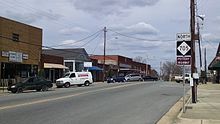North Carolina Highway 705
 | ||||
| Route information | ||||
| Maintained by NCDOT | ||||
| Length | 26.1 mi[1] (42.0 km) | |||
| Existed | 1931–present | |||
| Major junctions | ||||
| South end | ||||
| North end | ||||
| Location | ||||
| Country | United States | |||
| State | North Carolina | |||
| Counties | Moore, Randolph | |||
| Highway system | ||||
| ||||
North Carolina Highway 705 (NC 705) is a primary state highway in the U.S. state of North Carolina. The route is marked as the Pottery Highway or Pottery Road and as a North Carolina Scenic Byway[2] due to the large number of potters in and surrounding Seagrove.
Route description
[edit]This article about roads may need to be written in a south-to-north or west-to-east direction. |


NC 705 begins at a northern terminus near Seagrove, North Carolina at I-73/I-74US 220 exit 45. It passes through Seagrove, crossing US 220 Alternate. The highway travels southeasterly in Randolph County where it passes through the community of Whynot southeast of Seagrove.
The route passes into Moore County just north of the communities of Dover and Westmoore. It continues southwesterly through Robbins, North Carolina where it junctions with NC 24/NC 27 just south of Robbins at the community of Garners Store. From the junction, the route turns southeasterly and continues through the community of Zion Grove until it ends in the community of Elberta near Eagle Springs, North Carolina.
Pottery Road
[edit]The route takes the traveler through historic areas of North Carolina which have been making and selling hand-turned or "hand-thrown" pottery since the eighteenth century.[3] The area potters produce traditional functional pottery as well as artistic pottery.
The Cole, Auman, Owen, Teague, and Albright families are eighth- and ninth-generation potters in Seagrove and the surrounding areas.
Some of the oldest, historic pottery locations still in operation include the "Original" Owens Pottery founded in 1895[4] and Jugtown Pottery founded in 1921.[5] Jugtown is listed on the National Register of Historic Places.
Plank Road
[edit]Portions of the route are part of the Fayetteville and Western Plank Road connecting the city of Fayetteville, North Carolina with Moravian settlements near Bethania, North Carolina (northwest of Winston-Salem).
History
[edit]This section is empty. You can help by adding to it. (June 2014) |
Junction list
[edit]| County | Location | mi[1] | km | Destinations | Notes |
|---|---|---|---|---|---|
| Moore | Eagle Springs | 0.0 | 0.0 | ||
| Robbins | 9.2 | 14.8 | |||
| Randolph | Seagrove | 25.2 | 40.6 | ||
| | 26.0– 26.1 | 41.8– 42.0 | Exit 61 (I-73/I-74) | ||
| 1.000 mi = 1.609 km; 1.000 km = 0.621 mi | |||||
See also
[edit]- North Carolina Bicycle Route 6 - Concurrent with NC 705 from Old Plank Road in Seagrove to I-73/I-74/US 220
References
[edit]- ^ a b "North Carolina Highway 705" (Map). Google Maps. Retrieved April 30, 2015.
- ^ National Scenic Byways Online. "Pottery Road - Overview". Retrieved 2006-12-29.
- ^ SAPA - Learn more about the history of Seagrove, NC and its North Carolina potters
- ^ Tradition and Modernity: The Potters of Seagrove, North Carolina
- ^ Encyclopedia of North Carolina :: UNC Press
External links
[edit] Media related to North Carolina Highway 705 at Wikimedia Commons
Media related to North Carolina Highway 705 at Wikimedia Commons- NCRoads.com: N.C. 705
- https://discoverseagrove.com/

